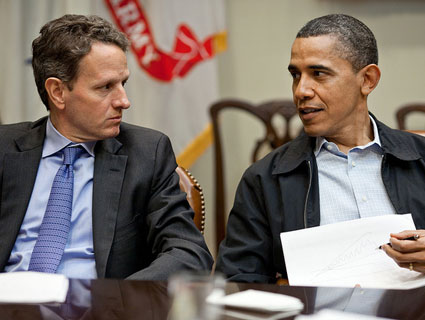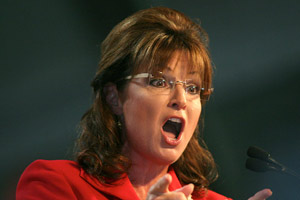
President Barack Obama chats with Timothy Geithner, the secretary of the Treasury.<a href="http://www.flickr.com/photos/whitehouse/5640444091/sizes/z/in/photostream/">Pete Souza</a>/White House photo
The Obama administration wants Americans to realize what a good job it and the Bush administration did saving the economy from a second Great Depression. But they’d prefer not to make this case directly. They want journalists to do it for them.
On Friday, the Treasury Department convened one of its semi-regular, invitation-only background press briefings for journalists. Senior Treasury officials spoke to us, answered our questions, and showed us a “deck,” which is annoying industry jargon for a PowerPoint presentation. “I just know this is going to be a fucking waste of time—another dog-and-pony show,” another journalist told me on our way into the meeting. The central message of the dog-and-pony show was that the US response to the 2008 financial collapse was pretty effective, especially when compared to how other countries reacted to different crises. The PowerPoint presentation used terms like “bank investment programs,” but what the Treasury gang was talking about was the highly unpopular financial bailouts (as opposed to the auto bailouts, which the Obama team views as a political winner).
The Treasury officials said many true things. It’s certainly possible that if the government hadn’t acted quickly, the 2008 financial crisis could have been as disastrous as the Great Depression. Many of the bailouts—or “rescues,” as Treasury calls them—have resulted in net gains for the taxpayers. (The current value of the government’s shares in AIG, for example, exceed the amount of money it has yet to recover from that bailout.) The Treasury is right that countries confront major economic crises frequently and that the United States will probably face one again. And it’s legitimate for the Obama administration to worry that its successors will look at the interventions made in the markets in 2008 and fear that such action is not worth the immense political costs. Consequently, they discern the need to get good press for these bailouts.
The journalists in the room justifiably focused their questions on things that the Obama administration and the Treasury Department have not done well enough: helping struggling homeowners, lowering unemployment, and moving towards a financial order where these sorts of crises are no longer inevitable. The Treasury folks mostly wanted to talk about how successful the bailouts were. But they made that argument in a no-direct-quotes, no-television, you-can’t-even-say-our-names briefing for 20 or so journalists on a Friday afternoon. In other words, in a manner that would not associate them too closely with this argument. They did it in this fashion because they want to influence our future reporting (a fair-enough desire). But they don’t want to take on the political challenge of directly defending their massively unpopular actions in the public eye.
Senior Treasury officials clearly believe that the financial sector bailouts were a brave choice that worked out as well as anyone could have hoped, and they said as much on Friday. I’m bound by the agreement not to quote any of them directly.
But when asked about the bank bailouts in public, Obama and top administration officials usually mention that the Bush administration launched the bailouts, talk about them as something America “had” to do, and change the subject as quickly as possible. One example is Obama’s 2010 State of the Union address. “If there’s one thing that has unified Democrats and Republicans, and everybody in between, it’s that we all hated the bank bailout,” Obama said. “I hated it. I hated it. You hated it. It was about as popular as a root canal.” He went on to describe the bailout as a “necessary” step taken by “the last administration,” arguing that “if we had allowed the meltdown of the financial system, unemployment might be double what it is today,” with more businesses closed and more homes lost.
In that speech, the bailout was the equivalent of cutting off your hand when it’s caught under a bolder and you’re dying of thirst: a terrible thing to which there was no alternative. That’s a bit at odds with how senior Treasury officials spoke about the bailouts on Friday: a wise choice that worked out better than anyone could have anticipated, and a program that makes the administration proud. That appraisal is not on the record.













